Top 10 Health Benefits of Persimmon
The persimmon is a fruit that grows on trees of the Diospyros genus. It, like the tomato, is technically a berry but is rarely thought of as one. The fruit is ... read more...harvested in late autumn and occasionally remains on the tree throughout the winter. The hue might range from yellow to dark red-orange depending on the strain. Persimmons may be eaten fresh, dried, or cooked and are widely used in jellies, beverages, pies, curries, and puddings across the world. Persimmons are not only delicious, but they are also high in nutrients that can improve your health in a variety of ways. Read on for more information.
-
Though small in size, persimmons are packed with an impressive amount of nutrients. In fact, one persimmon (168 grams) contains:
- Calories: 118
- Carbs: 31 grams
- Protein: 1 gram
- Fat: 0.3 grams
- Fiber: 6 grams
- Vitamin A: 55% of the RDI
- Vitamin C: 22% of the RDI
- Vitamin E: 6% of the RDI
- Vitamin K: 5% of the RDI
- Vitamin B6 (pyridoxine): 8% of the RDI
- Potassium: 8% of the RDI
- Copper: 9% of the RDI
- Manganese: 30% of the RDI
Persimmons include thiamin (B1), riboflavin (B2), folate, magnesium, and phosphorus. These vibrant fruits are low in calories and high in fiber, making them an ideal weight-loss snack. A single persimmon provides more than half of the daily value of vitamin A, a fat-soluble vitamin essential for immune function, eyesight, and embryonic development. Apart from vitamins and minerals, persimmons include a variety of plant chemicals, such as tannins, flavonoids, and carotenoids, which can benefit your health. The leaves of the persimmon fruit are high in vitamin C, tannins, and fiber, and are used in medicinal teas.

Loaded With Nutrients 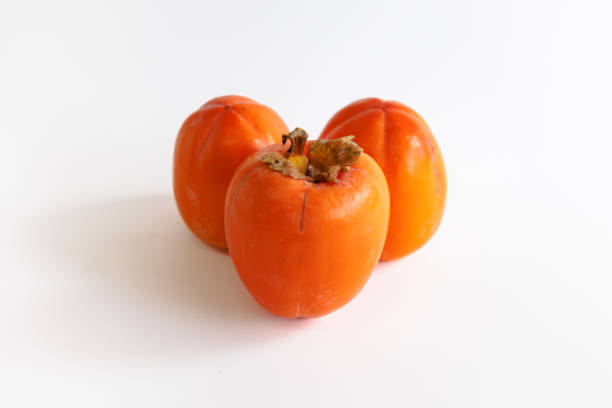
Loaded With Nutrients -
Plant components with antioxidant properties are found in persimmons. Antioxidants serve to prevent or reduce cell damage by combating oxidative stress, which is caused by unstable molecules known as free radicals. Certain chronic illnesses, such as heart disease, diabetes, cancer, and neurological problems such as Alzheimer's, have been related to oxidative stress. Consuming antioxidant-rich foods like persimmons, on the other hand, might help battle oxidative stress and may lower the risk of some chronic illnesses.
Flavonoids, potent antioxidants present in high amounts in persimmon peel and meat, have been associated with decreased risks of heart disease, age-related mental decline, and lung cancer. Persimmons are also high in carotenoid antioxidants such as beta-carotene, a pigment present in many colorful fruits and vegetables. Diets high in beta-carotene have been related to a decreased risk of heart disease, lung cancer, colorectal cancer, and metabolic disorders. Research of over 37,000 adults also discovered that those with a high dietary intake of beta-carotene had a considerably lower chance of getting type 2 diabetes.

Excellent Source of Powerful Antioxidants 
Excellent Source of Powerful Antioxidants -
Heart disease is the largest cause of mortality in the world, affecting the lives of millions of people. Most types of heart disease, however, may be avoided by eliminating risk factors such as a poor diet. Persimmons are a good choice for improving heart health due to their potent mix of nutrients. Flavonoid antioxidants found in persimmons include quercetin and kaempferol. A flavonoid-rich diet has been associated with a lower risk of heart disease in various studies.
A study of nearly 98,000 adults indicated that those who consumed the most flavonoids had 18% fewer fatalities from heart-related illnesses than those who consumed the least. Flavonoid-rich diets can benefit heart health by lowering blood pressure, lowering "bad" LDL cholesterol, and decreasing inflammation. Furthermore, the tannins that give unripe persimmons their bitter taste may reduce blood pressure. Tannic acid and gallic acid, both contained in persimmons, have been demonstrated in several animal tests to be beneficial at decreasing high blood pressure, a key risk factor for heart disease.

May Benefit Heart Health 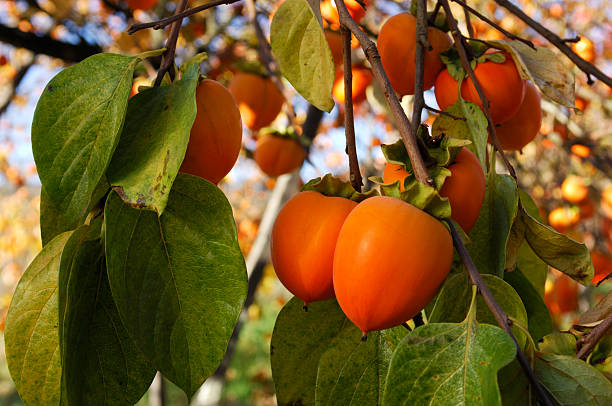
May Benefit Heart Health -
Chronic inflammation has been related to conditions such as heart disease, arthritis, diabetes, cancer, and obesity. Fortunately, eating foods strong in anti-inflammatory chemicals can help reduce inflammation and illness risk. Persimmons are high in vitamin C, a powerful antioxidant. In fact, one persimmon has 20% of the daily required requirement. Vitamin C protects cells from free radical damage and fights inflammation in the body.
Vitamin C mitigates free radical damage by giving an electron to these unstable molecules, neutralizing them, and avoiding further damage. The body produces C-reactive protein and interleukin-6 in response to inflammation. An eight-week trial of 64 obese persons revealed that taking 500 mg of vitamin C twice daily lowered C-reactive protein and interleukin-6 levels considerably. Furthermore, significant studies have linked increased dietary vitamin C intake to a lower risk of inflammatory illnesses such as heart disease, prostate cancer, and diabetes. Persimmons also include carotenoids, flavonoids, and vitamin E, all of which are powerful antioxidants that help the body combat inflammation.

Help Reduce Inflammation 
Help Reduce Inflammation -
Excess cholesterol, particularly "bad" LDL cholesterol, increases the risk of heart disease, stroke, and heart attack. Soluble fiber-rich foods, such as fruits and vegetables, can help decrease high cholesterol levels by assisting the body in excreting excess quantities of it. Persimmons are a high-fiber fruit that has been demonstrated to reduce LDL cholesterol. According to one study, persons who ate cookie bars containing persimmon fiber three times a day for 12 weeks had a substantial drop in LDL cholesterol compared to those who ate bars without persimmon fiber.
Fiber is also necessary for regular bowel movements and can aid in the reduction of high blood sugar levels. Persimmons are high in soluble fiber, which slows carbohydrate digestion and sugar absorption, preventing blood sugar rises. A study of 117 diabetics found that increasing soluble dietary fiber consumption resulted in substantial changes in blood sugar levels. Furthermore, fiber feeds the "good" bacteria in your intestines, which can improve your digestion and general health.
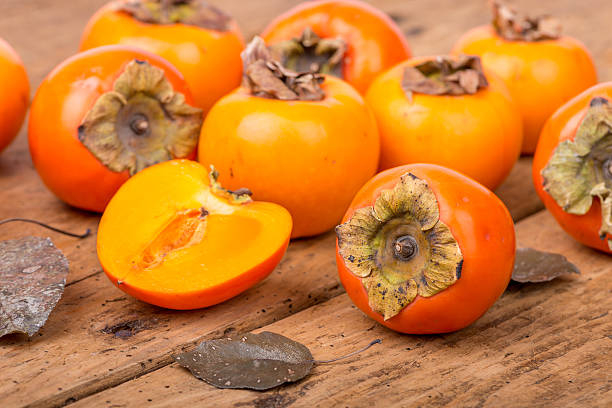
Rich in Fiber 
Rich in Fiber -
Persimmons are high in vitamin A and antioxidants, both of which are important for eye health. In fact, one persimmon contains 55% of the daily required amount of vitamin A. Vitamin A helps the conjunctival membranes and cornea operate properly. Furthermore, it is a vital component of rhodopsin, a protein required for normal eyesight. Persimmons also contain carotenoid antioxidants lutein and zeaxanthin, which support healthy vision. These chemicals are abundant in the retina, a light-sensitive layer of tissue located in the back of the eye.
Diets high in lutein and zeaxanthin may lower the risk of some eye illnesses, such as age-related macular degeneration, a retinal condition that can cause vision loss. Research of over 100,000 participants discovered that those who took the most lutein and zeaxanthin had a 40% lower chance of getting age-related macular degeneration than those who consumed the least.

Support Healthy Vision 
Support Healthy Vision -
Include persimmon in your diet and your immune system will be boosted in no time. With a stronger immune system, you will be able to cope with illnesses much more effectively. The ascorbic acid concentration of persimmon contributes to its immune-boosting qualities; a single serving has 80 percent of your daily ascorbic acid or vitamin C need. This vitamin strengthens your immune system by stimulating the creation of white blood cells, making it simpler to combat viral, microbial, and fungal illnesses.
Potassium is abundant in persimmons. This mineral functions as a vasodilator, which means it dilates blood vessels and promotes blood circulation. With increased blood flow to all regions of your body, your heart will have to work less, lowering your risk of cardiovascular disease. Many additional chemical substances in persimmons widen blood arteries and reduce blood pressure.

Boost immune system and regulates blood pressure 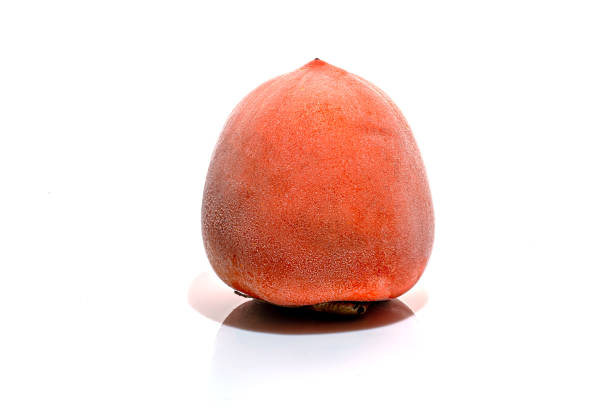
Boost immune system and regulates blood pressure -
Persimmons are healthy because they contain numerous B-vitamin components, including folic acid, pyridoxine, and thiamin. These components work together to support many metabolic activities and enzymatic processes in the body. Including persimmons in your diet can assist raise your metabolism, promote energy generation, improve digestion, increase muscular tone, and boost your immune system.
As previously said, one of the numerous persimmon health advantages is that it dilates blood vessels, which increases blood circulation. It does, however, supply copper, which aids in the creation of new red blood cells. Many important nutrients cannot be used by your body if you do not have enough copper. Eating persimmons promotes hemoglobin production, which improves blood circulation and has a good effect on muscular tone, cognitive function, energy levels, and metabolism.

Improves metabolism and blood circulation 
Improves metabolism and blood circulation -
Persimmons, like many fiber-rich foods, are healthy for your digestive system. If you've been suffering from constipation for a long time, eating persimmons might be quite beneficial. It also aids in the prevention of liver disorders. It also aids in the reduction of water retention in the body due to its high fiber content.
Persimmons help you maintain a healthy body weight in a variety of ways. It increases metabolism, allowing you to utilise food for energy. This will result in less fat buildup in the body. Furthermore, persimmons have enough fiber to ease constipation and reduce water retention, which will help you lose weight.

Improve digestion and help you lose weight 
Improve digestion and help you lose weight -
Persimmon has several anti-cancer chemicals and dramatically improves your body's capacity to eliminate free radicals. Free radicals can cause oxidative damage and raise your chance of getting several forms of cancer. Persimmons include antioxidants, which assist to remove free radicals from your system and prevent oxidative damage. They also include vitamin A and C, as well as phenolic chemicals such as gallocatechin and catechins. These chemicals also aid to increase cancer protection.
One of the numerous persimmon health advantages is that it decreases your cancer risk while also lowering your chances of having tumors. This is because persimmons contain betulinic acid, an anti-tumor chemical. If you already have a tumor, incorporating persimmon into your diet will prevent it from spreading.

Prevent cancer and have ant-tumor properties 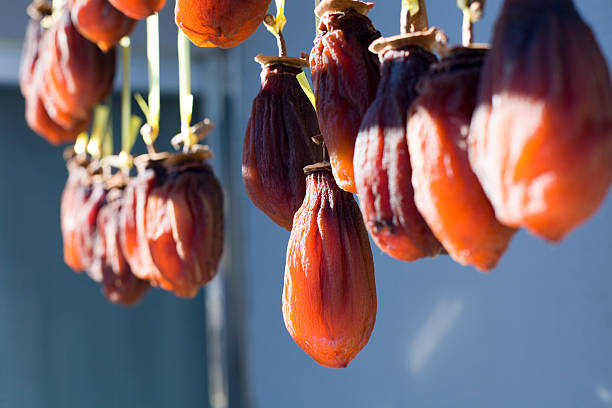
Prevent cancer and have ant-tumor properties































